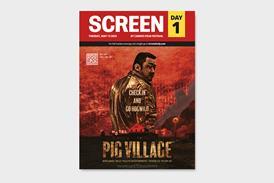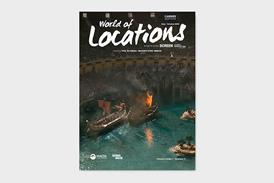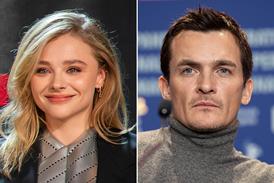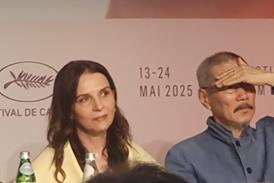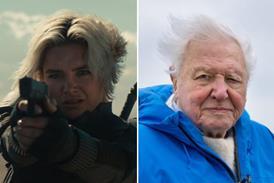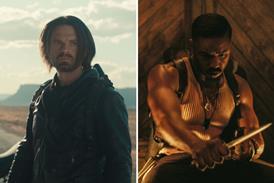Screen International’s chief critic Fionnuala Halligan blogs on the Cannes Competition.
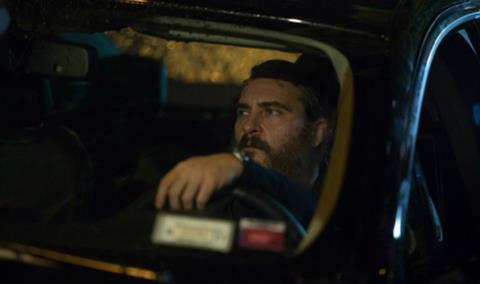
May 27
You Were Never Really Here
Cannes Competition has drawn to a close on a powerful note, with Lynn Ramsay’s singular You Were Never Really Here. Sharp and compact, at 85 minutes, it’s dazzling show of force from the Scottish auteur, even if the noir narrative peg on which she hangs her vision boils over by the end. Along with Ruben Ostlund’s The Square, You Were Never Really Here is the most exciting cinema to showcase at Cannes; the former may be too long, but the latter leaves us asking for more.
This Travis Bickle-tinged tale of a hammer-wielding hitman (Joaquin Phoenix) who becomes entangled in a larger conspiracy must be in with a chance at the Palme D’Or. That’s of course exciting in itself, but of added significance in that it would mark only the second time in the festival’s 70-year history that the prize has gone to a woman, and the first outright win (Jane Campion’s The Piano shared the prize with Chen Kaige’s Farewell My Concubine, after which the rules were changed). With The Square, Loveless, The Killing Of A Sacred Deer and BPM (Beats Per Minute), You Were Never Really Here made an impact in a year which couldn’t help but disappoint after 2016’s fireworks.
Still, that’s getting ahead of ourselves. You Were Never Really Here shows Ramsay at the top of her game after a seven-year absence from the screen, and her strobing, nightmarish, very particular vision is certainly one which will entrance critics and can rightly be deemed progressive for cinema as an art. Ramsay had not finished the film when it was selected by Cannes; one viewing is enough to understand why festival chief Thierry Fremaux wanted it so badly he was prepared to take the risk.
May 26
In The Fade

In Cannes 70’s penultimate film, Fatih Akin turns his hand to a straight-up revenge drama with a story about a German woman (Diane Kruger) whose Turkish husband and six year-old son are murdered in a terrorist attack in Hamburg. In The Fade is strongest in its opening section, where an impessive Kruger gets a chance to show her mettle as the devastated widow, surrounded by grieving relatives of both cultures and a police force which begins to unravel exactly what has taken place. By Act II, however, which takes place in a courtroom where the murderers are prosecuted, the seams are beginning to show and In The Fade starts to feel sketchily plotted and uncomfortably exploitative. It may be badly timed, but does seem that a film about terrorists, bombs and murdered children should try a little harder, and not resort to plastering factual end-tites over a silly ending in an attempt to find some retrospective relevance.
Still, Kruger’s performance is palpably strong, and it alone makes In The Fade noteworthy. The faultline stresses between the German and Turkish communities in Hamburg are also nicely drawn before the film plays out in Greece.That, coupled with the attention it will undoubtedly achieve, should see Akin’s film hook into an audience at home in Germany and interested parties overseas. Critical reaction, however, may well be mixed.
May 25
Amant Double

You’ve got to hand it to a film which takes a speculum-eye shot of a cervical examination as one of its opening images. Like Elle last year, and playing almost in the same timeslot, Francois Ozon’s Amant Double is gleefully flashy, trashy fun. Paying homage to Brian De Palma — and, indeed Elle’s director Paul Verhoeven - it was a big surprise from a director whose last film was the sober and mysterious black-and-white World War I drama Frantz. And it’s such good fun to see a Ozon, who also wrote, enjoying himself like this, even if the film verges towards the hilariously lurid with its stuffed cats and sidelong glances. (Jury president Pedro Almodovar might have glimpsed some of his own influence at play here, in particular Cannes competitors Broken Embraces or The Skin I Live In. All roads lead back to Hitchcock, of course).
Body doubles, shattered glass and jagged mirrors are Ozon’s currency in this story of an emotionally unstable woman (Marine Vacth) who forms a relationship with her therapist (Jeremie Renier) and discovers he has a violent twin brother with whom she also becomes sexually entangled. It’s all rather salacious and determinedly frivolous, moving from cervix to strap-on in a most agile fashion. Renier is smooth in both parts, Vacth is riveting, if a little bug-eyed on occasion, Jacqueline Bisset lends gravitas.
Sales should be brisk.
Good Time

The Safdie brothers more than justified their first place in Competition with the therapeutically energetic Good Time, low-budget, urgent indie film-making at its most propulsive and, even if the story had difficulty sustaining itself the whole way through, a blast through a weary Palais des Festivals as Cannes 70 heads for its last three titles (from Francois Ozon, Fatih Akin and Lynn Ramsay).
Unless you’re into wooden stakes and rosaries of garlic you’ll have to admit that Robert Pattinson has struggled to find a role he can really bury his way into: he gets it here at last, in tight close-up, as cunning, reckless small-time Queens crook Connie who loves his mentally-disabled brother Nick (Benny Safdie) to distraction, but not in a way that’s good for either of them. When he foolishly drags Nick into a bank heist, Good Time blasts off into a night of unpredictability - rapid-fire situation followed by unexpected resolution as Connie ducks and weaves. He doesn’t have much in the way of speeches or back story, but Pattinson has it covered, and the Safdies have his back.
Sustaining that pace over a half an hour is beyond the reach of most film-makers, and the Safdie Brothers try for 100 minutes. Their story may be running on tired legs by the end, but their characters or camera never, ever flag.
May 24
A Gentle Creature
Sergei Loznitsa’s (My Joy, In The Fog) third narrative feature is his most audacious and caustic to date and will be the most taxing on general audiences. This is decidedly specialised cinema, using stark charactersiations to compose a dark allegory about Mother Russia - past, present and future. The film then pitches into a lurid dream sequence with lengthy speeches which, it has to be said, don’t always fare well in translation. If the Cannes film festival is a smorgasbord of world cinema, this is the anchovy for mature palates.
Sharing a title (only) with a Dostoyevsky short story, A Gentle Creature is a castigation of the Russian state, full of references, both cinematic, literary and historical, which may not all resonate with international audiences, although it also seems clear that this will not be shown in Russia (it shot in Lithuania). It’s the kind of film which would best benefit from a prize here, despite the clear commerical obstacles in its way and the very mixed critical reaction.
Loznitsa’s three narrative features to date have wheeled and circled in precise calibrations: this follows suit. Big and ambitious, screen-eating cinema, it is about a nameless woman who takes a journey to a Kafka-esque hellhole and, once there, spins around in a purgatory of moral decrepitude and State-backed corruption and violence. The Story of Qiu Jiu gets a particulary bleak Russian drubbing, is soaked in vodka and set alight over two-and-a-half hours.
The Beguiled

It has been a flat few days at Cannes, with a string of disappointments after the weekend. Sofia Coppola broke that run with her low-budget The Beguiled, a trip back to 1864 Virginia with the booms of Civil War battles resounding in the background of the deserted Plantation gates. Seven women and young girls have been left to their own devices in the Farnsworth Seminary run by Miss Martha (Nicole Kidman) and teacher Edwina (Kirsten Dunst). They’re completely cut off until a wounded Union solder (Colin Farrell) arrives to provoke a stirring. Sexual tension stews inside a battle of wills as the war encircles them all, Once again, Nicole Kidman shows us what she’s made of, and for the second time at this year’s Cannes, Colin Farrell raises his game to match hers.
It’s possible that this film, a remake of a Clint Eastwood picture made 45 years ago, will appeal more to women than men with its driving theme of sexual needs, appetites and the desire for power in a world where nobody holds any real control over their circumstances. Certainly, critical reactions were mixed, as has often been the case at Cannes this year.
Once again Coppola has placed her female characters inside a hermetically-sealed microcosm and watched what happens next. It’s a beautifully-realised world, set apart from society yet defined by it. It also looks gorgeous,shimmery and lush, and occasionally indistinct. Yet that’s in stark contrast to the precision of the whole piece. One of the shorter films at Cannes at 94 minutes, Coppola makes every shot work with demonstrably tight, starry yet independent film-making.
May 23
Rodin

Jacques Doillon’s lengthy (two hours), authentic, and bracingly sober biopic of the sculptor Rodin chipped heavily on the press corps, many of whom walked out. Defeated, perhaps, by Vincent Lindon’s flinty interpretation of the growling sex-pest, who bounced between his matronly wife and the luminous Camille Claudel (Izia Higelin), when he wasn’t having threesomes with giggling, hair-tossing, naked teenage models, that is.
That makes Rodin sound more lively than it is. Apparently this fictionalised account of the artist’s most productive years (there is much, much talk and footage of his sculpture of Balzac) came out of a documentary project Doillon was working on. Thus the film was shot in Rodin’s home and studio and feels authentic, down to the wallpaper. If viewers are looking at the wallpaper, though, the film is in trouble.
As in real life, Camille doesn’t get much of a look-in. However, this is the third French film in the last two decades to dramatise their relationship (Camille Claudel and Camille Claudel 1915). So there’s plenty to choose from. With competition for the French slots at Cannes Competition being so intense, Rodin is an odd selection n the light of the vibrant French film-making which is being showcased down the road at Director’s Fortnight and across the hallway in Un Certain Regard.
Radiance

Naomi Kawase’s warm Radiance played out to some frosty reviews at Cannes. Some fell for this wistful, soft-edged tale of a beautiful young woman (Misaki Ayam) who writes film audio descriptions and a world-famous photographer (Nagase Masatoshi) who has lost his sight. Polite yet obvious, it made much play of soft-focus light on Ayam’s face and the dark of Masatoshi’s existence in the middle of sentimental examination of the marriage of words with images. Many, many soft-focus close-ups on Ayam’s unsually wide eyes, however, took their toll as the wistful piano score plonked on.
Radiance is a film which fits well into Kawase’s body of work, and will play to her audience without extending the fanbase any. Cannes has long been a devotee of this Japanese director, who brought some light into an otherwise somber morning as the news of the Manchester bombings arrived from Britain and the festival stopped for a minute’s silence.
May 22
The Day After

As is well reported, black-and-white drama The Day After is Hong Sangsoo’s third film this year, the second at Cannes, and the only one not to be centred around the romantic travails of a film-maker. It’s also the most interesting, albeit in a slyly tentative way. This time, the beleagured man in the middle of three women in Hong’s film is an unfaithful book publisher (played by Kwon Haehyo). Cho Yun-hee plays his angry, menopausal wife; Im Sae-byuk is his girlfriend, and The Handmaiden’s Kim Min-hee is a smart young Christian woman who starts to work for him. (Kim, reportedly in a relationship with the director, has starred in all his 2017 ouevre).
There’s something very lovely and unique about Hong’s style when he’s on form, and he is here; his sudden pans and close-ups, and the way his characters talk so much, chatting, crying, shouting, over endless cups of coffee and late-night soju. Naturally there’s a case of mistaken identity as well. The dialogue swerves and circles, and Hong has cut the chronology to increase that effect. The Day After is a subtle, intimate film which is may be rediscovered after the festival when attention spans aren’t cut quite so short. And quietly, the critics on Screen’s jury responded, divided mostly between three and four stars, with the odd two dotted in.
The Killing Of A Sacred Deer

Fabulously polarising — the Screen Cannes critics jury loved it or loathed it, with no in-betweens - Yorgos Lanthimos’ coldly shocking The Killing Of A Sacred Deer opens with a shot of a beating heart, and it turns out to be an ancient, bleak one. The story soberly pulses out in clinical settings with characters who seem stark and hidden until, about mid-way, the viewer suddenly realises that we are not really walking the sterile corridors of an American hospital with an Irish heart surgeon (Colin Farrell), his opthalmologist wife (Nicole Kidman) and their children (Raffey Cassidy and Sunny Suljic). Instead Lanthimos, with his regular co-writer Efthimis Filippou, have set us down the path of classical Greek tragedy Iphegenia In Aulis by Euripedes - who also wrote Medea, if that’s any sense of how brutal this gets.
Irish rising star Barry Keoghan plays Martin, an unexplained presence in Farrell’s life: the least said about his character in advance, the better, except to note that this film fields tremendous performances all round.
Nicole Kidman is at the top of her game as the steely, controlling wife and mother; Colin Farrell is cold ballast as the noble, hubristic patriarch, and the younger actors all impress. It’s very much the kind of film, though, where you stand up to realise the person next to you has a violently opposing view of this chilling piece. With A24 set to release in the US, Sacred Deer looks commercially promising - even more so than Lanthimos’ last, The Lobster - and it would be a surprise not to see Kidman positioned for awards play.
May 21
Happy End

In the fullness of time and academic research, Michael Haneke’s Happy End may find a robust appreciation society: the first screening hit the Palais des Festivas with a muffled thud, hoever, as critics discovered something never previously encountered: minor league Haneke. Time for the cliche that minor-league Haneke still outstrips the competition, or Competition? Perhaps.
The second family drama of the day after The Meyerowitz Stories, this was typically precision Haneke - but instead of exploring new ground, it skipped through his greatest hits. Isabelle Huppert and Jean-Louis Trintignant return from Amour, again playing a father and daughter, Anne. The wealthy Laurent family is fleshed out, however, with her troubled son (Franz Rogowski), philandering brother (Matthieu Kassovitz), his newly-arrived 13 year-old daughter Eve (Fantine Harguin, with 86 year-old Trintignant, the most interesting characters in the piece). Toby Jones pops up as Anne’s British banker boyfriend.
Happy End becomes a chamber piece as this family and their satellites play several stories out. Mobile phone footage abounds, sprinkled with a lengthy interlude spent watching two minor characters Facebook-dirty to each other. For quite a small unit, the family seems particularly accident prone, between car crashes, suicides, and euthanasia. By the time its scattered situations begin to build to something, it’s already time to leave.
Distributors may well be disappointed this morning, although outside Cannes Happy End may find a different reception. With moments of humour - although this is certainly no comedy - it will intrigue followers of the two-time Palme D’Or winner.
The Meyerowitz Stories

The main controversy of Cannes Competition so far is the appearance of Netflix, certainly not what appears in a Netflix film.
The Meyerowitz Stories (New And Selected) treads familiar ground for director Noah Baumbach (The Squid And The Whale), but this is still a warm and complete story of a family blighted in individual ways by a domineering patriarch (Dustin Hoffman). Well acted by an ensemble which includes Ben Stiller, Elizabeth Marvel, Emma Thompson, Grace Van Patten and Candice Bergman, it features a particularly strong performance from Adam Sandler, playing it straight as the ‘loser’ older son. Enjoyably detailed and with a humorous tone cloaking some serious and painful universal truths, Meyerowitz is nonetheless conventional, a safe film for a 70th edition Cannes which approaches the end of the first weekend with little in the way of real fireworks or danger.
Sandler impresses in Meyerowitz as Danny, the older, unappreciated son of retired sculptor Harold (Hoffman) and never-employed, soon-to-be-divorced devoted dad of Eliza (Von Patten) who is off to college. Emma Thompson’s Maureen is his alcoholic step-mum, Ben Stiller’s Matthew is his half-brother, while Elizabeth Marvel makes a mark as his ignored sister Jean.
May 20
Redoutable
As it turns out, Redoutable is the film about a director that would have been an excellent opening film for Cannes, after the film about a director which did open it (Ismael’s Ghosts) bombed. The director in question is Jean-Luc Godard, as seen through the eyes of Michel Hazanavicius (The Artist). Led by a dynamic, absorbing performance from Louis Garrel, this light, bright and breezy tres-tres-French pastiche is based on the memoir by Godard’s first wife Anne Wiazemsky and focuses heavily on 1968, a pivotal year in both their marriage and French politics (the only year Cannes came to a halt, after Godard and his compatriots Truffaut and Lelouch forced a shut-down after five days in sympathy with the student protests).
Unfortunately, Wiazemsky, 19 at the time of her marriage (he was 37) and a philosophy student, gets short shrift for the most part of the film, which seems regrettable in the light of the fact that it was her book which prompted the piece. Stacey Martin (Nymphomaniac) isn’t awarded a role to play inasmuch as a series of loving looks and nude shots. While eventually Anne does have her say, it’s Garrel’s depiction of the amusingly misanthropic, buffoonish revolutionary which ends up being the film’s true highlight and selling point.
The pastiche elements are entertaining throughout, the pleasure rising exponentially the more you know about the Swiss-French auteur, although die-hard Godard fans may resist. It’s certainly not for the uninitated, but there could be an eager art-house crowd - those who devoured 2015’s Hitchcock/Truffaut - who turns breathless for this.
BPM (Beats Per Minute)

Director Robin Campillo’s personal experience of AIDS activism in Paris in the 1980s informs the moving BPM: Beats Per Minute, which marries an authentic story with a superb ensemble cast to lovingly recreate a desperately sad era which was also, he reminds us, joyful and angry and loving and, in a bravura hospital sequence, tenderly sexual. While it perhaps travels the same ground as Angels In America, it combines a fascinating account of ground-level activism with a convincing love story which we know to be doomed.
Campillo tracks the progression of the disease in young firebrand Sean (Nahuel Perez Biscayart, excellent) with a clinical precision even as the scenes involving ACT UP Paris’s activism (led by Adele Haenel) and increasingly-urgent weekly meetings are shot almost documentary-style. In between, strobing dance-floor sequences are, oddly, enchanting.
BPM is quite a tearjerker, and its sexual open-ness is welcome (although still tasteful). It may ultimately have more resonance for French audiences watching their own story play out, but it’s a strong, moving reminder of a time - and people - who should never be forgotten and, as such, should make a universal connection.
May 19
The Square

Expectations were high for Ruben Östlund’s follow-up to Force Majeure, and while The Square delivered, it was in fits and starts and parts and bursts, as this talented Swedish director indulged himself in a long film of many brilliant, disjointed ideas and a narrative that stopped every now and then to take in the scenery .It may, apparently, be re-edited. If it wasn’t quite as emphatic a success as Östlund’s fans had hoped, The Square was certain on one score: Danish actor Claes Bang has made a significant breakthrough.
As Christian, the suave curator of Stockholm’s swish museum of contemporary art, a multi-faceted character of many contradictions, Bang eases The Square through its difficulties, and shines in the best parts - which include his liason with a journalist played memorably by Elisabeth Moss (although co-star Domic West appears in more of a cameo than his high billing might suggest). As the easily confident Christian embarks on a series of mistakes which set the film in motion, Östlund skewers the art world and its lofty intentions, contrasting its bubble - or square - with those displaced outside.
Highlights include an onstage Q&A disrupted by a man with Tourette’s (“camel toe!” being amongst the more memorable interjections); a high-falutin’ dinner provoked by a performance artist (played by Terry Notary); and pair of renegade marketing millennials who launch a toxic but successful viral campaign for the museum’s upcoming exhibition. There are tense moments too, when Christian’s brio gets the better of him. Yet an interlude where he jumps around a garbage dump or a sequence with his children performing in a pageant, for example, seem frustratingly to only be there because they look good.
Okja

Okja is the second film in Cannes Competition, after Wonderstruck, to come across as a child’s film which is best appreciated by adults. The first Netflix film to compete here, it’s a Pig In The City yarn about a cute, intelligent genetically-engineered animal who is grimly destined for the oven despite her idyllic upraising in the Korean countryside.
Bong Joon Ho’s Okja, a cross between an elephant and a pig, is a beautiful creature indeed. She runs and rolls, jumps into pools, crashes through shopping malls and, indeed, emotes with ease. She’s a technical miracle, and a GM miracle for Tilda Swinton’s nasty corporation which wants Okja to front its public relations-led overhaul before they carve her up for the table.
Bong sketches the story of a young Korean orphan girl (played beautifully by An Seo Hyu) who raises Okja and follows her to New York City in broad strokes and outsized characters, led by Swinton’s dual role as feuding twins and a squeaky Jake Gyllenhaal as the Steve Irwin-style peronality who is the public face of the pig-breeding scheme. When the Animal Liberation Front, headed by a droll Paul Dano, gets involved, chase and capture sequences are geniunely entertaining in a mad-cap, haphazard way.
As unpredicatable as ever, Bong has delivered a meaty sermon here which stretches to pig rape and an interlude in an abbatoir: perhaps not something for either children or a TV dinner when all those Netflix subscribers eventually tune in.
May 18
Jupiter’s Moon
Jupiter’s Moon is crammed full of ideas and energy. Not all of them work out, although they might have, with a little more discipline. This is a story about a Syrian refugee who is gunned down in a Hungarian police state but wakes up with special powers to levitate and a film for specialised audiences. Kornél Mundruczó’s follow-up to White God was the first film to attract boos from the Palais press corps (apart from the Netflix and Amazon Studios logos, that is).
Likened by many to Children Of God, Jupiter”s Moon crams unexpected and effective action sequences into the hot-button issue of the callous treatment of refugees in Europe and shrouds it all with Jesus references - the levitating boy whose father is a carpenter and whose chief ally is a Judas-turned-Peter, etc.
Stern (Merab Ninidze) is a corrupt doctor working at a refugee camp and bilking its inmates to pay off his debts when encounters young Aryan (Zsombor Jéger) levitating after his gunshot wounds should surely have killed him. When Stern - an adroit performance from Ninidze - starts to use Aryan’s powers to scam money off his wealthy patients, he is doggedly pursued by the violent officer who shot Aryan in the first place. The chase is on, literally, as crooked characters run for their lives, cars go into hot pursuit and our angel hovers over over it all, even turning a house upside down alongside his aerial rotation.
There’s a sense that Mundruczó knows what his final sequence is, but isn’t always sure how to get there, adding sequences instead of shaping the piece. The end result is an uneven, but occasionally inspired, film.
Wonderstruck

A shift of pace - for the festival and for Todd Haynes, who brought the artful children’s film Wonderstruck to the Palais two years after the ravishing Carol. Comprising two interlocking narratives, from 1927 (in black-and-white and silent) and 1977 (full period colour and honkytonk costumes), it focuses on an 11 year-old boy who looks for his mysteriously absent father after the death of his mother (played in flashback by Michelle Williams). Back in 1920s New York, a young deaf girl longs for her silent movie star mother (Julianne Moore).
Even without knowing it’s drawn from work by the same author as The Invention of Hugo Cabret, there are clear narrative and tonal similarities (a young boy alone, a hideaway in a beloved landmark, this time the Museum of Natural History). And, unsurprisingly, Haynes’ artistic hand is magnificently present, in wonderfully-etched sequences and miniscule, entrancing details down to the very filth on the floors of 1977’s Port Authority bus station. He doesn’t just build one perfect world, but two. Overall, though, while Wonderstruck is a patchily-striking film which finally gels together into an impressive conclusion, some narrative inconsistencies plague this ethereal piece.
The fact that the girl, played expressively by Millicent Simmons, and the boy Ben (Oakes Fegley), are, at least in part, deaf, gives Haynes the opportunity to play with sound and Carter Burwell’s magnificent score, and the dialogue is sparse throughout. He mixes this aural entrancement with heightened 1920s visuals (including recreating a silent movie) and colour-popping 1970s West Side New York. Technically and artistically, it’s fascinating. Commercially, it’s an interesting prospect for Amazon Studios in the US - a luscious children’s film best appreciated by savvy adult eyes.
May 17
Loveless
Amid tight security, and after the disappointment of opening film Ismael’s Ghosts, Cannes 2017 Competition started powerfully: Andrey Zvyagintsev (Leviathan) delivered a scouring, corrosive portrait of middle-class Russia in Loveless, a brilliant film of snaking dread and despair. A couple who loathe each other barely notice when their 12 year-old son goes missing; each has a new partner and the child has become an obstacle in the way of their new lives.
Zvyagintsev slowly layers his detailed observations on this framework until the film, like Aarvo Part’s coruscating pieces, sits under the skin of the viewer, who flinches at his forthright condemnation of his country. Shot around St Petersburg in mid-winter by Zvyagintsev’s regular cinematographer Mikhail Kritchman, Loveless is beautiful, chilly, observational as the story gathers force. In its forthright final frames, it’s also reminiscent of Jia Zhangke’s recent, more political work.
Sold by Wild Bunch and already taken for the US by SPC, Loveless is an art house certainty – despite its chilly title. While it’s an intrinsically Russian film, Loveless also feels like a statement for the global times we live in, with background noise noting tragic events in Ukraine which the characters barely notice.Two strong performances from Maryana Spivak and Alexey Rozin anchor the piece. The fact that it’s the first film to play here may go against it, but Loveless is a clear contender for major prizes on the last day.

